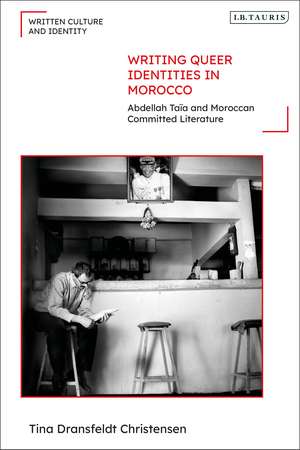Writing Queer Identities in Morocco: Abdellah Taïa and Moroccan Committed Literature: Written Culture and Identity
Autor Tina Dransfeldt Christensenen Limba Engleză Hardback – 27 ian 2021
| Toate formatele și edițiile | Preț | Express |
|---|---|---|
| Paperback (1) | 197.14 lei 6-8 săpt. | |
| Bloomsbury Publishing – 27 iul 2022 | 197.14 lei 6-8 săpt. | |
| Hardback (1) | 568.48 lei 6-8 săpt. | |
| Bloomsbury Publishing – 27 ian 2021 | 568.48 lei 6-8 săpt. |
Preț: 568.48 lei
Preț vechi: 815.77 lei
-30% Nou
Puncte Express: 853
Preț estimativ în valută:
108.78€ • 118.53$ • 91.66£
108.78€ • 118.53$ • 91.66£
Carte tipărită la comandă
Livrare economică 24 aprilie-08 mai
Preluare comenzi: 021 569.72.76
Specificații
ISBN-13: 9781788315852
ISBN-10: 1788315855
Pagini: 216
Dimensiuni: 156 x 234 x 20 mm
Greutate: 0.48 kg
Editura: Bloomsbury Publishing
Colecția I.B.Tauris
Seria Written Culture and Identity
Locul publicării:London, United Kingdom
ISBN-10: 1788315855
Pagini: 216
Dimensiuni: 156 x 234 x 20 mm
Greutate: 0.48 kg
Editura: Bloomsbury Publishing
Colecția I.B.Tauris
Seria Written Culture and Identity
Locul publicării:London, United Kingdom
Caracteristici
Middle East / North African literature and culture is widely studied across Literature, Cultural Studies, Gender Studies and Middle East / North African Studies departments
Notă biografică
Tina Dransfeldt Christensen holds an MA in Islamic Studies from University of Copenhagen, Denmark, and a PhD in Cultural Encounters from Roskilde University, Denmark. She is currently an external lecturer at Roskilde University. She has published in peer reviewed journals and collections including Expressions maghrébines, International Journal of Postcolonial Studies, Journal of North African Studies and Islamic Studies Journal.
Cuprins
Acknowledgements Notes on Transcriptions and TranslationsIntroduction1. Writing the self as a site of (queer) commitmentFrom "national allegory" to multidirectionality as a strategy of subversionThe dual function of self-narrationQueering the nation2. Abdellah Taïa as author and activist Breaking the silence La génération du "je"Homosexuality "à la marocaine"3. Subverting "ethnographic" reading strategies "Generation 54": Beyond ethnography and acculturation Nobody sees anybody: Driss Chraïbi's Le Passé simple Simply living a life of "deviance": Abdellah Taïa's L'Armée du salut4. Writing transidentity in the language of the "other" "Third Worldism" and French as language of resistance: The Souffles-Anfa¯s movement Toward an ethics of bilingualism: Abdelkébir Khatibi's Amour bilingue "Poor" French as a strategy of resistance: Abdellah Taïa's Un Pays pour mourir5. Shame, silence and nation building Gendered memories of political violence during the Years of Lead Dialogue of suffering: Fatna El Bouih's ?adith al-'atmah Taking revenge through love: Abdellah Taïa's InfidèlesConclusionNotesBibliography
Recenzii
Writing Queer Identities in Morocco tackles very significant aspects of Moroccan literature and society. Taïa's writing is suggestively related to crucial moments and authors since colonial times, such as Chraïbi and Khatibi, or to prison testimonies of the Years of Lead. In writing the self as an act of (queer) commitment and questioning any readily established identity categories, Taïa becomes one of the key voices, literally and politically, of the future of Morocco, that necessarily has to be queer.
"Writing Queer Identities in Morocco makes a very timely and important contribution to the field of queer Maghribi studies and North African studies more generally. Whereas Abdellah Taïa is often presented as an exceptionally "out" and "self-absorbed" Moroccan writer, the strength of Tina Dransfeldt Christensen's approach consists in situating his treatment of sexuality in relation to other Morocco writers and LGBTQ organising in Morocco. By recontextualising his individual story within the collective as a key site for the writing of queer identity, this book's rich, informative chapters invite us to consider committed literature and autobiographical writing in innovative ways."
"Writing Queer Identities in Morocco makes a very timely and important contribution to the field of queer Maghribi studies and North African studies more generally. Whereas Abdellah Taïa is often presented as an exceptionally "out" and "self-absorbed" Moroccan writer, the strength of Tina Dransfeldt Christensen's approach consists in situating his treatment of sexuality in relation to other Morocco writers and LGBTQ organising in Morocco. By recontextualising his individual story within the collective as a key site for the writing of queer identity, this book's rich, informative chapters invite us to consider committed literature and autobiographical writing in innovative ways."









